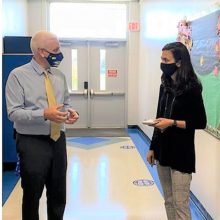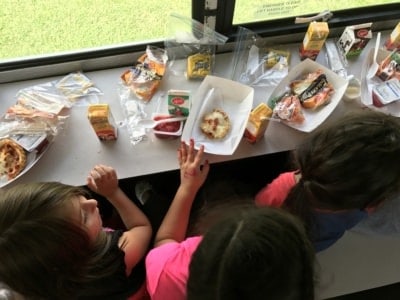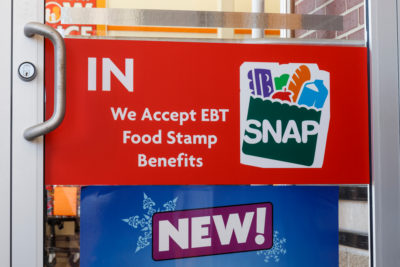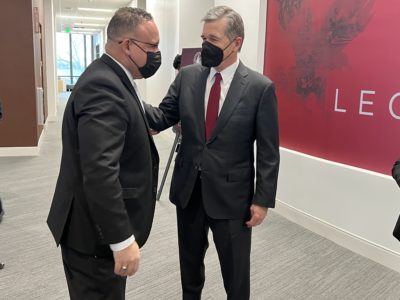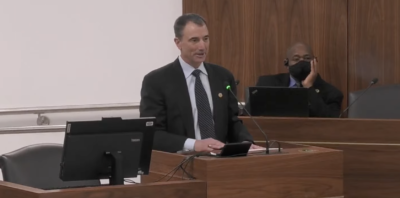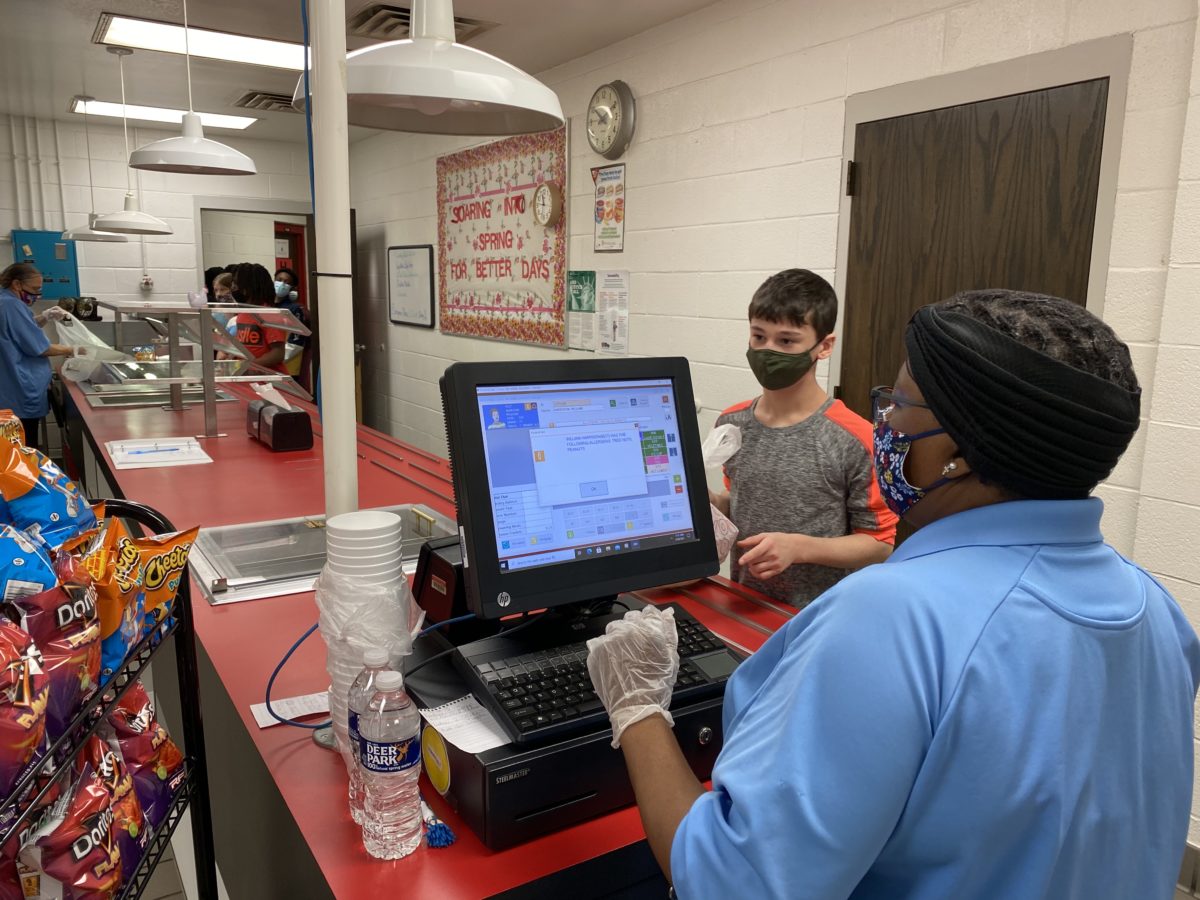

|
|
Amy Doty, principal at Perry Harrison Elementary in Chatham County, first realized how dire the situation facing the district’s school nutrition department was in the middle of summer 2021. As the school’s cafeteria manager, Brenda Cavalry, prepared to reopen Perry Harrison with only one food server due to challenges filling vacancies, Doty knew something had to be done.
“I knew as the principal that if we didn’t get our students fed in a timely manner, the rest of their day would deteriorate,” Doty said.
She also knew that she had to lead by example — if she was going to ask her staff to serve food, then she would, too. With that, Doty began helping out in the cafeteria, and serving lunch to students soon became a highlight of her day. Lori Kleberg, an Exceptional Children instructional assistant, also began to assist with serving lunch. Doty attributes the school’s ability to continue providing regular meals to the strong relationships that exist between staff members.
“Unity really does bring hope to a bad situation, because you can share in everybody’s personal experience. You give each other great support in times of need,” said Jennifer Ozkurt, director of school nutrition services in Chatham County.
This story is just one of the many silver linings shared during the 11th annual N.C. Child Hunger Leaders Conference. As school nutrition departments across North Carolina continue to face challenges amid the ongoing pandemic, the convening focused on celebrating silver linings of child nutrition efforts over the last year, including stories of hope, resilience, innovation, and surprise.
Hosted by the Carolina Hunger Initiative, part of the UNC Center for Health Promotion and Disease Prevention, the conference took place virtually on Feb. 17. The agenda covered a variety of topics related to school nutrition programs, including feeding students both inside and outside of school time, fighting childhood hunger through community partnerships, and enriching the hearts and minds of students through food.
In addition to silver linings shared by school nutrition staff and other nonprofits focused on childhood hunger, the conference featured brief remarks from numerous state officials who praised the work of child nutrition employees, including Gov. Roy Cooper and First Lady Kristin Cooper, Secretary of the Department of Health and Human Services Kody Kinsley, and Superintendent of Public Instruction Catherine Truitt.
Lynn Harvey, director of school nutrition and district operations for the Department of Public Instruction, reflected on some of the numbers that exemplify both the challenges and silver linings of school nutrition throughout the pandemic, including:
- 106: The number of federal waivers issued by the U.S. Department of Agriculture to support flexibilities for school nutrition departments and maximize reimbursements amid the pandemic.
- $1.73 billion: The amount of P-EBT food assistance benefits provided to North Carolina families of children who were learning virtually and didn’t have access to school meals.
- 13-27%: The average percentage of child nutrition staff vacancies as students returned to school in the fall.
- 20-25%: The average increase in the cost of food and food preparation supplies in the school nutrition marketplace over the last two years.
- 1.3 million: The approximate number of children who rely on school meals every day.
Full recordings of all conference sessions are available here.
Painting a picture of childhood hunger
During her remarks at the conference, Harvey also described a legislative committee meeting held in early February during which she spoke to legislators about the state’s efforts to continue feeding students amid the pandemic, especially when schools were operating remotely. At the end of her testimony, Harvey presented legislators with suggestions for continued support of child nutrition programs, including encouraging the extension of federal child nutrition waivers through next school year and beyond and considering state funding to supplement the federal funding for school nutrition programs.
The questioning from legislators that followed was largely related to the existence of child hunger in North Carolina.
“Much to my surprise, some on the committee, a few, were unaware of the stark reality of child hunger in our state. They were unaware of the fact that children, even in pre-pandemic times, showed up in the school cafeteria early on Monday mornings because they are hungry, having had very little food over the weekend,” said Harvey at the conference.
Although Harvey said this was a “dark cloud” moment for her, she realized the next day that it also offered a silver lining: the opportunity and responsibility to ensure all policymakers are informed about child hunger.
“Elected officials in every capacity — legislators at both the federal and state levels, county commissioners, city council, local board of education members, and other community stakeholders — need to know about child hunger in our state,” said Harvey. “They need to see the face of child hunger just as each of you do every day.”
With that, Harvey called on those attending the conference to contribute to a document that will be shared with stakeholders so they can better understand child hunger. She asked them to send her an email, letter, or document that describes their experience of serving children experiencing food insecurity or hunger.
“Help us paint, by our own numbers and our observations, a picture of the face of child hunger in North Carolina,” she said.
Later at the conference, Robert Taylor, deputy superintendent for school and student advancement with DPI, also spoke to the importance of providing school meals.
“The pandemic has solidified what we already knew about hunger: that food insecurity and hunger are real. Many people doubt this … but we recognize that this has exposed what we know about hunger across this country,” said Taylor. “We recognize that school-aged children continue to rely on school nutrition to fill whatever gap they may have outside of school.”
Taylor also noted that under state Superintendent Catherine Truitt’s Operation Polaris, DPI has set a goal to provide all students in grades K-5 with no-cost school breakfast and lunch by 2025.
“What is that connection to teaching and learning? Everyone knows that a fed mind operates better,” said Taylor. “And so if we actually want to increase academic performance, one of the best things we can do is to make sure that children (are fed) while they’re at school and they can concentrate on the school work and not an empty stomach.”
